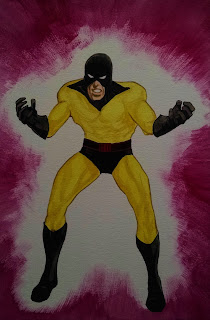LEGENDARY HEROES #48
THE BLACK HOOD
MLJ Comics was founded in 1939 by Maurice Coyne, Louis Silberkleit, and John Goldwater. The initials of their first names formed the MLJ of the company name. They started out publishing superhero comics and one of the most popular characters was the Black Hood, created by Harry Shorten and premiering in Top Notch Comics #9 in October 1940. The character was so popular that it soon began appearing in a pulp magazine. This was an unusual twist in that several pulp heroes like The Shadow and Doc Savage made the transition to comic books, but not the opposite. Black Hood Detective appeared as a pulp in September 1941, and was renamed Hooded Detective with the next issues in November 1941 and January 1942, before ceasing publication. All three pulp novels of the Black Hood were authored by G. T. Fleming-Roberts, a well established pulp writer. Despite the short run in the pulps, the Black Hood gained in popularity and was given his own title in 1943 while still appearing monthly in Top Notch Comics. On July 5, 1943 the Black Hood began appearing on the Mutual Broadcasting System as a radio drama for juvenile listeners. It was a 15-minute broadcast that aired five times a week with Scott Douglas as the Black Hood and Marjorie Cramer as his sweetheart Babs. The opening theme of the radio show was Dukas' The Sorcerer's Apprentice. 120 episodes were aired before coming to a close on January 14, 1944, mostly due to the inability to land a major national sponsor. Only one audio episode is known to exist, the first show "The Emerald Voodoo Ring".
In the origin comic book series the Black Hood was in reality Matthew Kipling "Kip" Burland, a former police officer who had been framed for grand larceny and left for dead by a villain called the Skull. Kip is trained by a hermit to become a superhero imbued with powers when he places a mystical hood over his head. Kip Burland eventually clears his name but continues to fight crime as the Black Hood. His love interest is a newspaper reporter named Barbara "Babs" Sutton, and the Black Hood drives a motorcycle called the Hoodcycle that can transform into other vehicles. The Black Hood remained in Top Notch Comics until issue #44 in April 1944 and then moved to Pep Comics #48 in May 1944. Black Hood Comics ended with #19 in the Summer 1946 with the superhero being unmasked in court. In the Pep Comics version Kip Burland hung up his hood to become a private eye in his final two appearances, coming to an end in issue #60, March 1947.
So what caused the downfall of the Black Hood who was once the most popular character at MLJ? When the publishers began replacing him on the comic book covers with humorous characters then his popularity plummeted. But who were these humorous characters that spelled the end of the Black Hood? Archie Andrews, Betty Cooper, and Jughead Jones. Created by Bob Montana, Archie and his friends debuted in Pep Comics #22 in December 1941 and it wasn't long before Archie and his Riverdale friends were the headliners at MLJ. Everything else took a backseat to the teenagers and their misadventures. Archie replaced the Black Hood on radio, running into the 1950s, and the subject of TV shows and animated cartoons from the 1960s until today. Archie even transitioned to newspapers in a successful comic strip that ran from 1946-2011 in 700 newspapers. In 1946 MLJ changed their name to Archie Comics Publications.
The Black Hood returned for a couple of appearances in Mighty Comics in the early 1960s, and six issues of the Mighty Crusaders in 1965-1966 but then he disappeared again. Archie Comics began a Red Circle line of hero themed comics in the 1970s and the Black Hood was resurrected once again with stories drawn by Gray Morrow and Neal Adams. In this version the character is the nephew of the original Black Hood, but this incarnation proved to be unsuccessful also. Eventually DC Comics bought the Black Hood and revived it in 1991 where it appears sporadically. A lame version of the Black Hood appeared in the CW show "Riverdale" which was probably appropriate. Archie killed the superhero line of MLJ.


.jpg)

.jpg)
Comments
Post a Comment